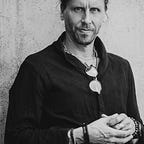EPISODE 8: THE POWER OF A REASON
Today I passed the California border … heading south to San Francisco … by boneshaker.
Nearly 1,000 kilometers traversed and 8,500 meters climbed (Everest stands at 8,848 meters). I’m moving through the antiquity of the Redwood Forest. A cathedral for giants made of wooden columns, green arches and stained glass. Cycling is an ideal pace to pass through. It’s slow enough to notice nuance, yet fast enough to compare change.
There’s a stretch between Brookings, Oregon and Klamath, California where the climb is particularly strong … especially after 60 kilometers. My legs were pained as I emerged from the forest shadows into a brief region of sunlight made warmer and brighter by its contrast. In that moment a butterfly … a monarch … joined me in its seemingly haphazard flight. It ambled through the bike’s frame, amongst the handlebars, around my body … all the while moving forward at the same pace as I. Minutes passed as did the meters, and still ‘George’ flew with me. Then, just as suddenly, he re-entered the Giant’s Cathedral. Monarchs are creatures that move across the whole of North America … across boundaries … seemingly indifferent to them in their remarkable adaptability (according to the Naturalist and friend Kate Nowak).
Sharing time with George and his kindred spirit diminished my fatigue. His brief presence gave my cells a moment of purpose to pedal. Meeting George was a spontaneous event to be sure. Was it random? Probably. Intentional? Unlikely. Meaningful? The cells of my heart, legs and mind seemed to think so.
Which brings me to the point of this blog: Adventure, as in life, needs A REASON.
On a Saturday afternoon about 40 years ago my grandfather was out mowing his front lawn … and died … and was buried next to Jimmy Hendrix, which was a mixed blessing. As much as I love Jimmy’s music, many of the flowers on Jimmy’s grave were not his. They migrated there from his neighbour’s. My grandfather was only 69 with no obvious illness. A couple years earlier he had retired from his 12-hours-a-day worklife.
Like many, my grandparents began their life together with next to nothing. They were first generation immigrants. When they married, she was 16 and he 18. Their livelihood was selling fruit and veg at the road’s edge in front of their 2-room house. My great grandmother, who was deaf and would later become blind (with even more determination), and who immigrated alone from the SW of England (an hour from where I, 100 years later, would raise my three gremlins), cut a hole in the house’s side through which she sold hotdogs to passers-by. Through tremendous effort, endurance and good fortune, that curbside stall became a chain of 8 grocery stores called Basket Foods in Renton, Washington. With that chain, my grandfather became a ‘pillar’ of the community — and indeed essential to many. Throughout life, his purpose was clear, and it was a purpose that mattered … in the sense that it intentionally had a consequential, positive impact on the lives of many others. But … his purpose died when he retired. And with that, his identity and heart followed soon thereafter.
The probability of death after retirement can come quickly … and before that cognitive decline. A study of Shell Oil employees found that people who retired early — and lived to be at least 65 — died sooner than people who retired at 65. Why? It’s the why that matters. When people lose their ‘why’ … when they stop moving in their life, whether emotionally, physically or economically, many — if not most — report that their reason … the ‘why’ that moved them … also stopped. And with that the ears of Death are pricked.
Which raises a fundamental question about the validity of ‘Maslov’s Hierarchy”. As many of you know, Maslov puts our ‘physiological needs’ at the foundation of our lives. And, of course, as physiological beings, this must be true: Our cells do indeed need Rest, Water, Energy and Warmth to survive. But Moslov’s foundational stage is at best incomplete.
Because our cells — it seems — also need a reason.
Imagine … you’re a solo pilot of a single engine plane …
To keep reading, please go here …
